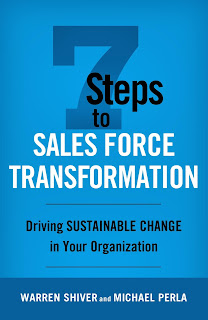A successful sales force transformation can mean increased revenue, increased sales productivity, and reduced cost of sales. But, up to seventy-five percent of attempted transformations fail, according to the authors of the book, 7 Steps To Sales Transformation - Driving Sustainable Change In Your Organization.
Transformation failures are often a result of an organization that neglects to address the human factor (skepticism, resistance, avoidance). Equally important, transformations must focus on truly transforming and not merely making tweaks.Authors Warren Shiver and Michael Perla use their own experiences transforming sales organizations, the lessons they learned from a host of interviewed sales professionals, and original, quantitative research to show readers how to transform and modernize a sales force -- including ones that are typically intrinsically resistant to change.
The recommended transformation seven steps are defined by these transformational levers:
- Drivers
- Vision
- Case
- Support
- Roadmap
- Implement
- Sustain
- A holistic and multidimensional program, one that touches on every part of the organization, not just sales.
Typically, these transformations take about a year and sometimes more than a year to achieve.
Question: Why do most transformations take about a year?
Shiver and Perla: A transformation is a fundamental change in how you sell. In order to effectively conduct the seven steps, including defining a vision, developing a case for change, and building support across functions, this up-front work takes time and is the key to a successful transformation. It can be shorter in terms of time, but you’ll have a higher likelihood that you will fail.
Warren Shiver
Question: And, why do you predict that successful transformations will in fact happen in about a year?
Shiver and Perla: In our survey of over a hundred sales organizations and in interviewing 35 sales executives and leaders, their biggest regret was not spending the time up-front to ensure that the sales transformation was going to be a success. For example, reviewing all the transformational levers, such as alignment, leadership and communications, and then methodically treating your sales transformation like a hard-fought, internal sales campaign with a clear roadmap to succeed and metrics and guideposts along the way. Another factor is that results take time to take hold.
Depending on the size and scope of the transformation, the sustain activities and timing can take three to six months to show results based on areas, such as sales cycle velocity, the need to onboard new sales/sales leadership talent, and showing early wins that help build and support the new behaviors, processes, and tools.
Michael Perla
Shiver is the Founder and Managing Partner of Symmetrics Group and has more than 20 years of sales, management and consulting experience working for firms, such as Accenture, OnTarget and North Highland. He holds an MBA from Duke University and a bachelor's in Mechanical Engineering from Georgia Institute of Technology.
Perla is a Principal with Symmetrics Group. and has more than 20 years of sales effectiveness consulting and strategic marketing experience working for firms, such as CA Technologies, Siebel Systems, Sales Performance International and North Highland. He holds two graduate degrees in Psychology from the University of Georgia and an MBA from Georgia State University.



Comments
Post a Comment